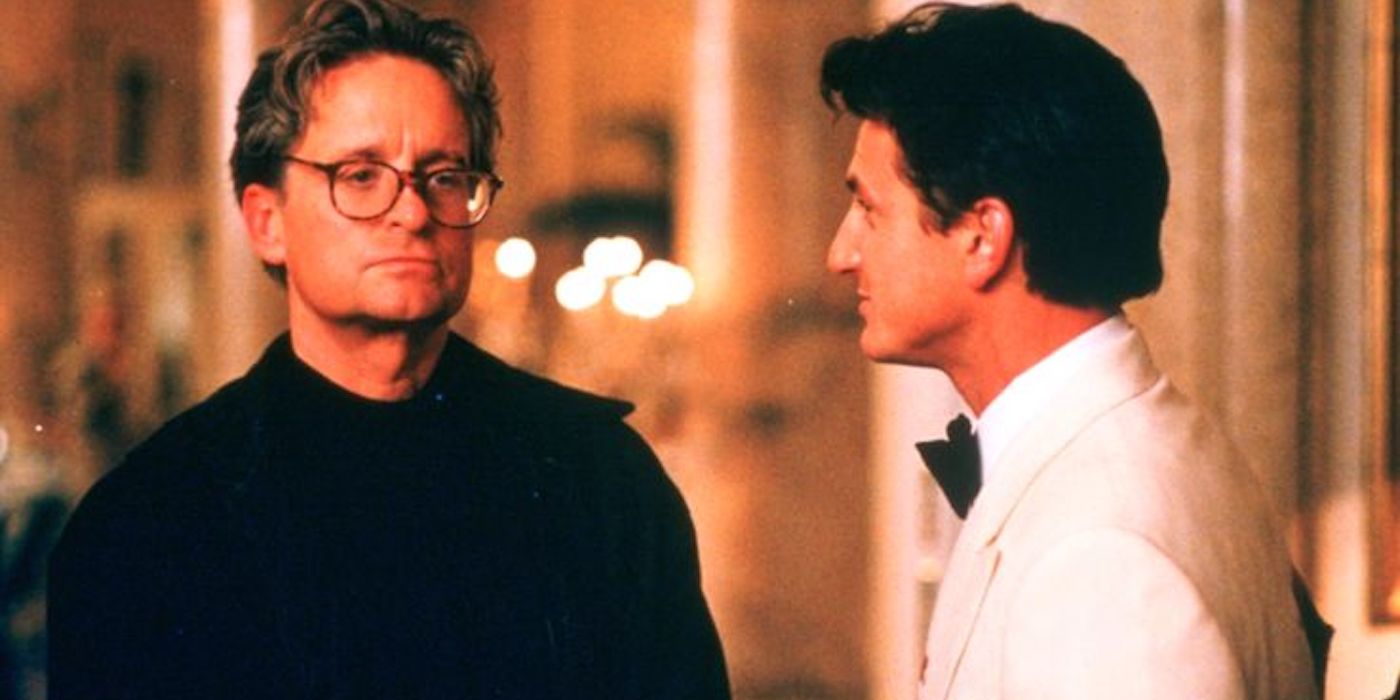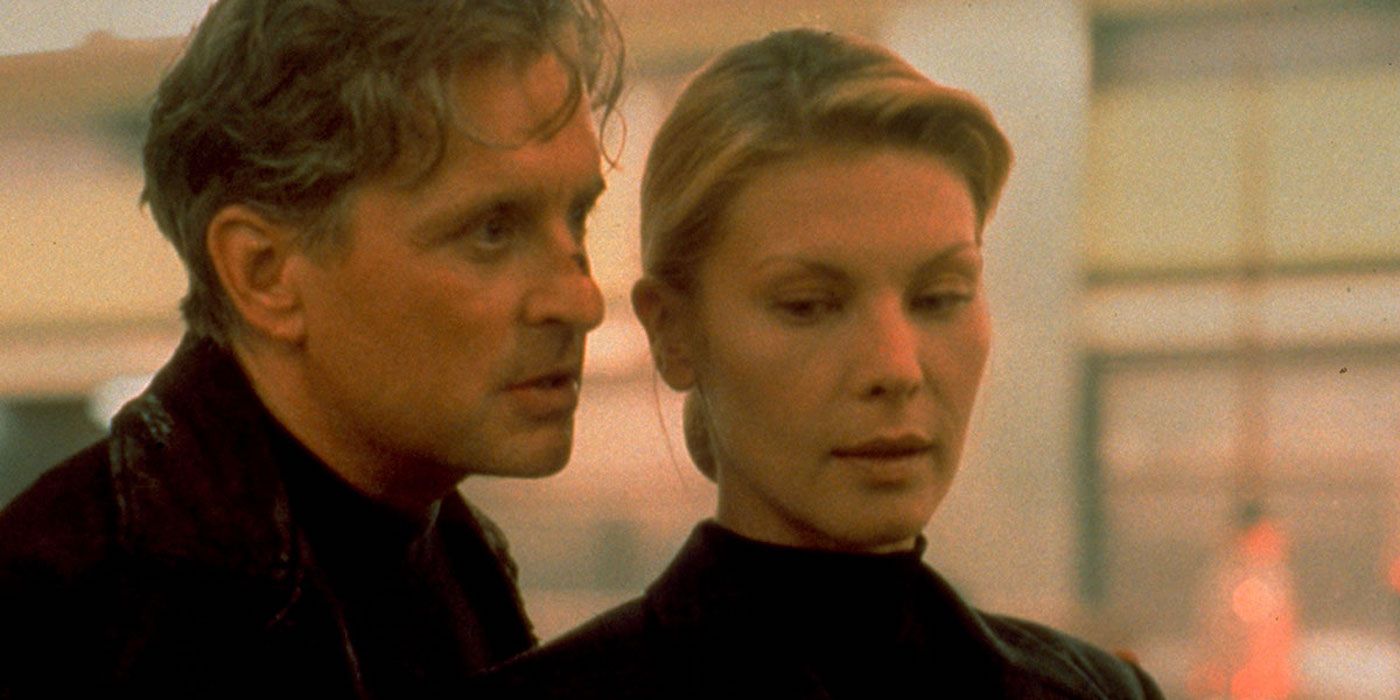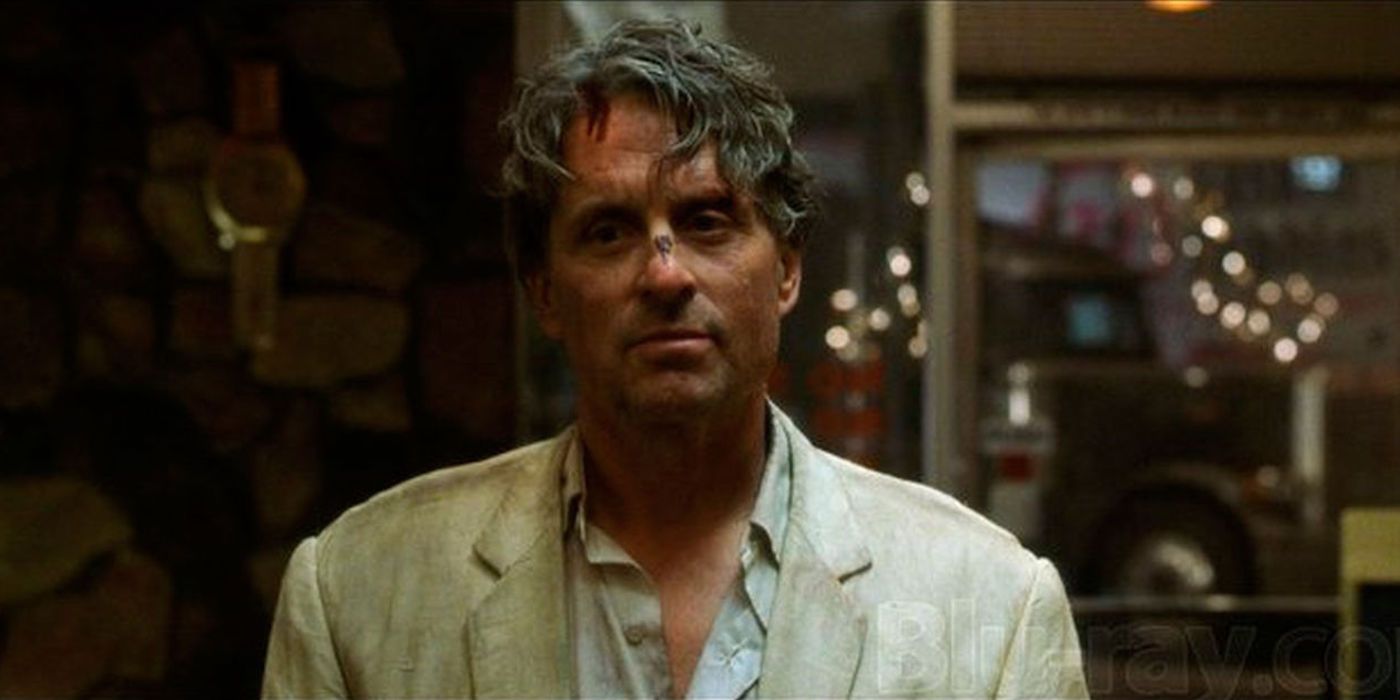The Game had a lot to live up to. It was the film David Fincher chose as his follow-up to the wildly acclaimed Seven, a film that had thrust the young director into the limelight and prevented his career from reaching a premature end after the mixed reaction to his debut, Alien 3. Suddenly, he was no longer the man who’d killed the little girl we’d spent all of Aliens trying to save. Instead, he was a fully realized auteur ready to carve out his place in the annals of cinema, and all eyes were on him to see what he would do next. What he came back with was The Game, a Hitchcockian thriller for the modern age that toned down the controversial subject matter of its predecessor to focus on being a more straightforward genre pic – a decision that raised a few eyebrows.
The film centers on Nicholas Van Orton (Michael Douglas), a wealthy investment banker who has everything but the one thing money can’t buy – happiness. For his 48th birthday, his estranged brother Conrad (Sean Penn) gives him a voucher for a mysterious game operated by the equally mysterious Consumer Recreation Services. Nicholas initially rejects the gift, but curiosity gets the better of him and he agrees to participate. However, it doesn’t take long before reality and the game become one and the same, and Nicholas finds himself caught in a web of conspiracy that grows tighter the more he tries to escape. It’s classic thriller stuff and would make for perfect late-night viewing for someone looking to escape into the fantastical world of movies. It’s the sort of thing Alfred Hitchcock excelled at, and while it’s an oversimplification to say that that’s all the film has going for it – touches of psychological thriller era Brian De Palma are scattered throughout, alongside the occasional moment of surrealism that feels closer to what Charlie Kaufman would later popularize – it’s undeniably a more crowd-pleasing experience than Fincher’s previous work.
It's perhaps this reason that contributed to its muted reaction. Reviews were positive but far from glowing, and its middling performance at the box office saw it ignored by all major award shows. Fincher himself considers it one of his weakest films, and in retrospect, it was a strange choice to base a sophomore feature around (Fincher likes to pretend Alien 3 never happened). Anyone else would have taken their newfound clout and made something more ambitious that would have left no doubt as to their filmmaking talents, but instead, he made a run-of-the-mill thriller any accomplished director could churn out in a weekend. If anything, Fight Club feels closer to a true follow-up to Seven, with The Game acting as a two-hour pitstop while Fincher refines his filmmaking methods. But Fincher has always excelled at taking these kinds of stories and elevating them with some of the greatest directing of their era, and The Game is no different. Even in his early years, his understanding of the language of filmmaking is unmatched, but crucially, he never draws attention to his own brilliance. What could have been an enjoyable but forgettable thriller is elevated by his presence, something he would later repeat in films like Panic Room and Gone Girl.
But if there is one thing The Game does better than anything else in his filmography, it’s atmosphere. The visage of San Francisco that Nicholas Van Orton finds himself trapped in is a wonderfully Pynchon-esque creation, and when combined with the labyrinthine nature of the story, it turns The Game into the perfect cinematic depiction of a nightmare. But as with all good nightmares, things start gently. A pen leaks on him before he has to catch a flight, and shortly after, his briefcase refuses to open during a business meeting. Gradually, however, these harmless pranks take a more sinister turn, and soon he’s fleeing from armed hit squads and discovering all his bank accounts have been emptied. He begins to suspect everyone he encounters – from a random homeless person on the street to even his own brother – are in on whatever sick game CRS is orchestrating, and it effectively becomes a running joke that every time he’s about to discover the truth, it turns out to be just another layer of this twisted charade. If you stop to think about the individual pieces they fall apart (just how is CRS capable of executing something of this scale without anything going wrong?), but nightmares don’t make logical sense either, and when you’re trapped in the middle of one you’re not worrying about such things. Nicholas isn’t concerned with the rationale of locking someone in a taxi and driving it into the San Francisco Bay, and neither would you if you were in his situation. Douglas conveys Nicholas' paranoia flawlessly and succeeds in making a snobby businessman a sympathetic character.
The central mystery in The Game is discovering just what on earth "the game" even is, with whatever scraps Nicholas is able to gather only raising more questions (“whereas once I was blind, now I can see” one former player describes it as during an ominous conversation). About the only thing we do know of the game is that each round is tailor-made for each specific player. In this respect, Nicholas’s ordeal is one of his own creation. His only desire is to make money and satiate his ego, and the moment either of them appears threatened his entire being shatters like glass. When he fails to deliver business partner Anson Baer (Armin Mueller-Stahl) his severance package due to his briefcase not opening, you get the feeling that this is the first time Nicholas’s reputation has ever been called into question. No surprise then that we immediately cut to Nicholas trying to destroy said briefcase by smashing it against a bench. Sometime later, we find out that $600 million has been taken from his accounts. It’s not like he was going to use it for anything other than propping up his own vanity, but he’s mortified regardless. His worst nightmare has come true, and he appears utterly defeated as he stares at the wreckage.
The Game’s pacing is some of the finest in the genre. The screenwriter duo of John Brancato and Michael Ferris (along with some uncredited revisions from Seven writer Andrew Kevin Walker) avoid playing their best cards too early and keep the plot twists coming with the regularity of a ticking clock. The dialogue is also excellent, with plenty of snarky one-liners befitting a world of such cruelty (“Does Rose Kennedy have a black dress?” Nicholas retorts when asked if he had a good birthday). One of their smartest additions is Christine (Deborah Kara Unger), a waitress who gets unintentionally caught up in Nicholas’s game… or at least, that’s what he’s supposed to think. Then he visits her house and discovers all her furniture still has their price tags on and none of the taps in the kitchen work. Sure enough, the one person he thought he could trust was working with CRS all along, and even her claims of being a traitor are later revealed to be just another ruse. Her fluctuating role between ally and villain is a clear reimagining of the femme fatale archetype, but Unger avoids the old clichés and transforms Christine into a far more compelling (albeit still seductive) character.
But an impressive script is nothing without someone capable of telling it, and Fincher’s direction becomes an essential component of this terrifying odyssey. The visuals are simple but never thoughtless, favoring clean compositions that always keep Nicholas at the forefront. The muted colors and minimal use of lighting project a shadowy look that suits this world like a glove. It’s no surprise the bulk of the film takes place at night, the time when even the most homely of locations take on a sinister touch, and sure enough, the comfort he once found in boardrooms or his million-dollar mansion (the biggest house on the street, as he so proudly proclaims at one point) is just one more thing CRS takes from him. The production design is also worthy of note, with grand locales drenched in excess dominating the first act before giving away to trash-filled alleyways and dust-filled cemeteries the further down the rabbit hole we go, each evoking Nicholas's loss of control that little bit more.
Choosing to open the film with a home video of a young Nicholas’s birthday is also an excellent choice. There’s something unsettling about watching such a joyful occasion via footage that’s so degraded it looks like a silent horror film. This disconnect between what we’re seeing and how we’re seeing it sets the tone of The Game perfectly. In this midst of the erosion, we catch glimpses of Nicholas’s father, a man who looks like he puts fun in the same category as disease. Shortly after, we learn he committed suicide and it’s clear his death left a grave impact on Nicholas. He may put up the façade of normality, but deep down Nicholas is a deeply troubled man who spends every waking moment battling his own personal nightmare – no coincidence, then, when CRS uses this as the first thing to torment him with by leaving a life-sized wooden clown outside his house (in the same place his father’s body was found). The cut from the young Nicholas to his adult counterpart is haunting, and not just because he now looks identical to his deceased father. He died at the age of 48, and today is Nicholas’s 48th birthday. Quite a coincidence indeed.
But the greatest trick Fincher pulls is dragging you into Nicholas’s nightmare so firmly that you’ll refuse to believe it’s over even when it really is. The truth will probably raise a few eyebrows when it’s finally revealed, but the more inquisitive viewers will instead be sitting back with their arms folding, refusing to fall for yet another fake out. Except this time, it doesn’t come – at least, that’s what we’re told. Stories don’t just stop when the credits start rolling and given the resources CRS are shown to possess, who knows where Nicholas’s life will lead him after he leaves his belated party. He seems remarkably passive during it, appearing to accept his fate rather than fighting against it. He may have become the better person Conrad wanted him to be, but who knows whether this truly is the end.
The Game is the ultimate sleight of hand, worming its way into your mind with such ease you don’t even realize it’s doing it. It’s a film that rewards multiple screenings (notice how many background actors reappear throughout the runtime) and serves as an excellent showcase of Fincher’s mastery of the genre picture. But above anything else, it’s still one of the scariest films that doesn’t fit the standard definition of a horror film. The concept of your own worst nightmare coming to life (backed by a company that might as well be the most powerful in the world) is terrifying stuff and lends itself to endless possibilities. Consider what yours would be - now that’s a scary thought.

.jpeg)


